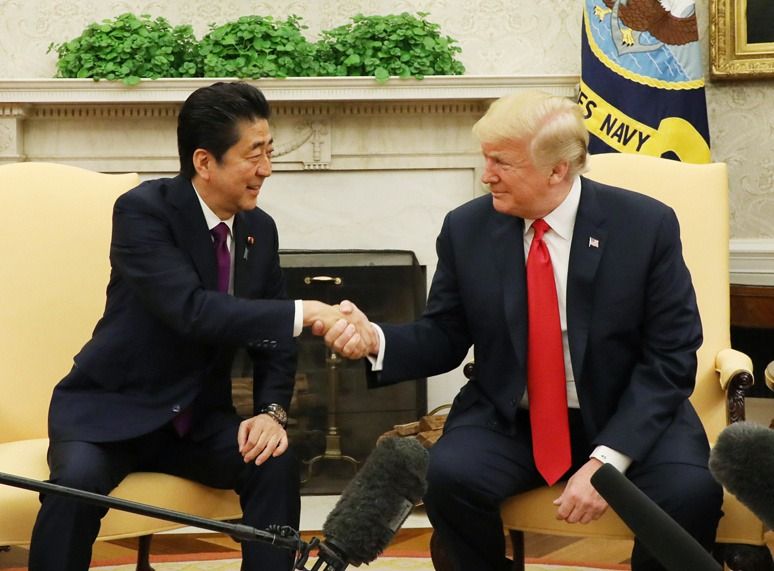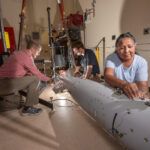After the Trump-Kim summit: Where does Japan go from here?
By Masako Toki | July 12, 2018
 President Trump and Japan's Prime Minister Shinzo Abe meet at the oval office.
President Trump and Japan's Prime Minister Shinzo Abe meet at the oval office.
Less than one year ago, President Donald Trump threatened to unleash “fire and fury” against North Korea, implying the possible use of nuclear weapons. This inflammatory rhetoric alarmed the world—especially the countries of East Asia. Trump’s threats were particularly upsetting to people in Hiroshima and Nagasaki, because his tweets came on the 72nd anniversary of the bombing of Nagasaki, the second and (hopefully) last city to experience catastrophic nuclear devastation. Memories of the effects of the atomic bombs dropped on these two cities in the first week of August 1945 have instilled a deep public abhorrence in Japan toward any use of nuclear weapons, anywhere.
Japan’s pacifist constitution is derived directly from such wartime experience, which led Japan to uphold an exclusively defense-oriented security policy while heavily relying on protection by the United States.
That does not leave Japan with many options in handling the situation with North Korea. Japan can conduct civilian evacuation drills, which indeed it started last year—even though many of the Japanese people harbor deep skepticism over the effectiveness of such drills, according to media reports. And Japan has been continuing to strengthen its anti-missile defense capabilities in cooperation with the United States (although this, too, draws some degree of skepticism over its effectiveness among Japanese people).
Meanwhile, North Korea has been fanning Japan’s nuclear fears, repeatedly testing its missiles by flying them over Japan or having them land in the adjacent Sea of Japan. Prime Minister Shinzo Abe publicly characterized North Korea’s actions as reaching a “new level” of concern.
That drove Japan to desperately seek to ensure strong a US commitment to Japan’s security in the form of the US nuclear umbrella, and US conventional armed forces.
Which ultimately means relying on… Donald Trump.
This raises some conundrums for Japan, a country which was already struggling with the perception that it was “the biggest loser of the Trump-Kim summit” in Singapore. Japan has to find its way, while dealing with an unpredictable, mercurial, and norms-busting president of the United States. Where Japan decides to go from here in terms of its national security—should it enhance its own defense capabilities, develop its own nuclear weapon capability, or continue to emphasize pacifism and global denuclearization—will say much about the country and its priorities. What leverage Japan has in dealing on its own with North Korea remains to be seen. But all is not bleak, and there are opportunities to be seized.
An unusual president, and a nervous Japan. When Trump was elected president, Prime Minister Abe was the first national leader to visit him, even before Trump was inaugurated. (After Trump was officially sworn into office, the UK’s Prime Minister, Theresa May, was the first head of state to meet him in person.) In the 18 months since Abe’s November 17 flying visit to Trump Tower in New York, Abe and Trump have spoken over 30 times, including telephone conversations. This is more than twice the number of times that Abe spoke with President Obama throughout the entire second term of Obama’s presidency.
Does this degree of contact show a close friendship between Abe and Trump?
Maybe.
But the truth is that Japan has been concerned about this unusual president because Japan is so extremely dependent on the United States for its own national security. The US-Japan alliance is the cornerstone of Japan’s security and foreign policy—and the basic, fundamental premise of this entire policy is based upon the notion that the United States is a credible military partner for Japan.
But Trump is not a conventional US president that Japan can rely on as it did with previous US presidents: The Trump presidency has been making unprecedentedly nerve-wracking demands upon its allies. Consequently, ever since Trump was elected, Japan has been nervous about the future of its alliance with the United States, and Abe has been working energetically to cultivate a close relationship with the president, repeatedly seeking assurances of US security commitments.
Abe is pulling out all the stops because Japan is heavily counting on the United States remaining a credible partner overall for the long term—even while the US keeps shifting its immediate, short-term positions, such as when US policy changed from one of maximum pressure against North Korea to one of a softer approach towards Pyongyang.
Admittedly, these wild gyrations in US policy have sometimes caught Japan short; despite Trump’s subsequent proclamations, Japan continues to view North Korea as an immediate threat and the Japanese government insists that North Korea needs to show it is making real, concrete steps to abandon its nuclear and missile programs.
Nevertheless, despite whatever zigs and zags the Trump administration has made regarding North Korea, Japan’s primary concerns regarding that country have stayed remarkably fixed: making sure that North Korea commits to the complete, verifiable, and irreversible dismantlement of nuclear warheads and ballistic missiles of all ranges, and making progress toward the release of Japan’s abductees. (Though these abductions have received relatively scant coverage in the Western press, they are a sensitive political topic in Tokyo. North Korea readily admits that it had kidnapped 13 Japanese citizens in the 1970s and ‘80s, for use as potential spies. Japan suspects that figure is far short of the real number of abductees, which could number in the dozens or hundreds, according to some accounts. So far, only five Japanese abductees have been returned to their homeland.) Japan has also insisted to the United States that any deal with North Korea should include mention of short- and medium- range ballistic missiles that can reach Japan and include chemical and biological weapons as well.
But while Prime Minister Abe made desperate efforts to keep Japan’s concerns on President Trump’s radar immediately before the June 12 summit in Singapore, the outcome of the Trump-Kim summit showed no real sign that North Korea would be taking any serious steps in the direction that Abe had asked of Trump.
Is there anything Japan can do? Japan has been in an uneasy predicament ever since Trump took office—especially after Trump abruptly decided to meet with Kim Jong-un in the first place. It was a completely different scenario from what the Japanese government had wished.
The most serious concern for Japan is that the disarmament negotiation between the United States and North Korea will not produce any tangible progress in reducing threats from nuclear weapons and ballistic missiles, while Trump gradually withdraws from the region. Given the prospect that Trump would prioritize his own self-promotion over Japan’s security interests, Japan is very nervous.
It is obvious that Abe was not satisfied with the result of the Trump-Kim summit, despite the diplomatic, face-saving comments Abe made immediately after its conclusion. It is fair to say that Japan was the biggest loser in this process; it is the widely accepted view that Japan was completely marginalized on the North Korean issue (despite Japanese government protests to the contrary). Japan is one of the most critical stakeholders on the North Korea issue with both short-term and long-term security concerns. Abe’s tireless effort to cultivate a relationship with Trump has not borne fruit.
However, Japan has no option but to be on the same page as the United States—at least, publicly. Given Trump’s unpredictability and mercurial temper, this has been an almost impossible task for the Japanese government.
Now, one could plausibly say that if the United States has become an untrustworthy partner under Trump, this situation represents a good opportunity for Japan to enhance its own defense capabilities, or even re-consider its own nuclear weapon capability. After all, Prime Minister Abe always wanted to be a more proactive player for international peace and security. But this is not a wise direction at all, and completely unrealistic regarding the idea of Japan acquiring nuclear weapons. It is conceivable that Japan would increase its defense spending; in fact, President Trump pressed Japan to purchase more US military equipment to help balance the US trade deficit with Japan.
How Japan can contribute to denuclearization of the Korean peninsula. At this stage, unfortunately, it looks like Japan’s leverage over North Korea is very limited.
This does not mean that Japan has no ways to influence the situation. Japan’s economic assistance is still very attractive to North Korea. Moreover, once (if) North Korea reaches the stage where it accepts inspectors from the International Atomic Energy Agency, Japan could cover a significant portion of the cost. Japan can also provide technical assistance in this area, based on its experience in the peaceful use of nuclear energy.
But Japan’s long-term contribution to denuclearization should be even more profound.
Given its painful past experience with nuclear weaponry, Japan could play a role as a moral authority, advocating the goal of Korean Peninsula denuclearization and go even further: a world without nuclear weapons. As the only country to have experienced nuclear devastation, Japan has a special role to play in nuclear disarmament.
But fulfilling this role will not be easy; Japan’s nuclear disarmament policy has always been full of contradictions, dating back to the beginning of the US-Japan alliance, when the very existence of the US nuclear umbrella over Japan’s head placed limitations on Japan’s efforts to pursue a world free of nuclear weapons. Being a beneficiary of US extended nuclear deterrence complicated Tokyo’s efforts to champion nuclear disarmament.
But while Japan has been criticized by disarmament advocates, at least it has not needed to pursue its own nuclear capability, based on the conviction that it already had credible US extended deterrence. And despite the increasing threats from North Korea, the Japanese government perceives that it is unrealistic to build its own nuclear deterrent—so far.
The US-Japan alliance needs to remain strong.The current situation regarding North Korea may be a good opportunity for Japan to be more proactive in terms of nuclear disarmament, though not in the same connotation that Prime Minister Abe uses the word. Rather than increasing its reliance on the US nuclear umbrella—which is Japan’s current inclination—Japan should take a stronger stance in favor of global nuclear disarmament. (Japan opposed the newly adopted Treaty on the Prohibition of Nuclear Weapons.)
North Korea has no intention of relinquishing its nuclear weapons and missiles anytime in the near future. Denuclearization is going to be a long process. Accordingly, the Japanese government should take the lead in reducing the role of nuclear weapons for international security and play a more active and effective role in stigmatizing nuclear weapons, much like how the hibakusha (atomic bomb survivors) of Hiroshima and Nagasaki significantly contributed to the Nuclear Weapons Ban Treaty negotiations.
There is a likely space for Prime Minister Abe to bring this up directly with Pyongyang; Abe is seeking to meet face-to-face with Kim Jong-un, because the abduction problem must ultimately be solved directly between the two countries involved. Such a meeting would be a good opportunity for Abe to convey to Kim the actual humanitarian impact of the use of nuclear weapons.
Admittedly, Kim Jong-un is notoriously inhumane, which means that he is likely to be unreceptive. Nevertheless, as prime minister of the only country that has suffered from nuclear devastation, Abe has the moral responsibility to convey the real humanitarian impact of the use of nuclear weapons to North Korea. He should even invite Kim to Hiroshima and Nagasaki.
While pacifist sentiment in the Japanese government—in particular, its commitment to a nuclear-weapons-free world—is fading away, civil society should not give up hope on this endeavor. Indeed, civil society should increase pressure on the Japanese government to go back to the primary moral starting point behind Japan’s policy of nuclear disarmament: the atomic bombings of Hiroshima and Nagasaki.
At this time, resurrecting the goal of nuclear disarmament may seem quite improbable to achieve. And it may not happen under Abe. But if Japan is truly serious about the goal of peace and stability in East Asia and a nuclear-weapons-free Korean Peninsula, Japan should try every possible avenue to convince the young authoritarian leader that nuclear weapons will not contribute to enhancing his country’s prosperity or prestige. Indeed, Japan is a great example of economic success and global influence—without nuclear weapons.
Together, we make the world safer.
The Bulletin elevates expert voices above the noise. But as an independent nonprofit organization, our operations depend on the support of readers like you. Help us continue to deliver quality journalism that holds leaders accountable. Your support of our work at any level is important. In return, we promise our coverage will be understandable, influential, vigilant, solution-oriented, and fair-minded. Together we can make a difference.
Keywords: Kim Jong-un, Korean Peninsula, Singapore Summit, Trump, denuclearization, hibakusha
Topics: Nuclear Risk, Opinion














